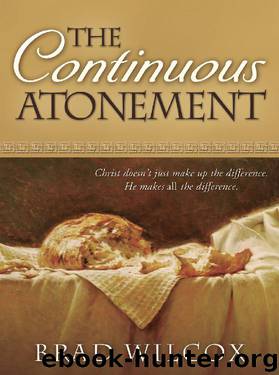Continuous Atonement by Brad Wilcox

Author:Brad Wilcox [Wilcox, Brad]
Language: eng
Format: epub
Tags: Inspiration, The Church of Jesus Christ of Latter-Day Saints
Publisher: Deseret Book Company
Published: 2009-05-15T06:00:00+00:00
Chapter 6
“After All We Can Do”
* * *
Christ’s requirements are not so that we can make the best of the Atonement, but so that— on His generous terms—the Atonement can make the best of us.
For we know that it is by grace that we are saved, after all we can do” (2 Nephi 25:23). This is one of the most widely quoted scriptures in the Church, yet it may also be one of the least understood. Until we fully comprehend it, the scripture can sometimes be a source of discouragement rather than hope.
The meaning of a sentence can change depending on which word is emphasized. For example, if we say, “THAT lady said it,” the meaning is different from stating, “that LADY said it,” “That lady SAID it,” or “That lady said IT.” In the same way, as we vary the emphasis on the words found in 2 Nephi 25:23, we see the verse in a new light.
AFTER All We Can Do
For a long time I believed the word after in this verse was time related. I believed I had to do all I possibly could and then grace would kick in—as if it were a finishing touch to all I had to first accomplish alone. Then I thought of Paul and Alma the Younger, who did nothing first—or even at all—and yet received great spiritual blessings. I reflected on the many manifestations of grace in my own life that I had received long before I did “my part.”
Donald P. Mangum and Brenton G. Yorgason point out that if we see the verse in the context of the chapters surrounding it, we see “that Nephi simply wasn’t focusing on the central importance of our works, or ‘doing all we can do’ first. In fact, much to the contrary, he was delivering a message concerning the central importance of the mission of the Messiah . . . [and] the magnitude of the great gifts that come from him” (Amazing Grace, 58).
For example, in the very next chapter (2 Nephi 26:25) Nephi extends the invitation to “Come . . . buy milk and honey, without money and without price.” No time condition is mentioned. Perhaps this is why the word after could also be read as in spite of. We are saved by grace in spite of all we can do (see Amazing Grace, 61).
Stephen E. Robinson wrote, “I understand the preposition ‘after’ in 2 Nephi 25:23 to be a preposition of separation rather than a preposition of time. It denotes logical separateness rather than temporal sequence. We are saved by grace ‘apart from all we can do,’ or ‘all we can do notwithstanding,’ or even ‘regardless of all we can do.’ Another acceptable paraphrase of the sense of the verse might read, ‘We are still saved by grace, after all is said and done’” (Believing Christ, 91).
Christ’s power is not an emergency generator that turns on once our supply is exhausted. It is not a booster engine once we run out of steam.
Download
This site does not store any files on its server. We only index and link to content provided by other sites. Please contact the content providers to delete copyright contents if any and email us, we'll remove relevant links or contents immediately.
| Amish | Catholicism |
| Christian Science | Jehovah's Witness |
| Mennonite | Messianic Judaism |
| Mormonism | Orthodoxy |
| Protestantism |
Under the Banner of Heaven: A Story of Violent Faith by Jon Krakauer(1423)
The Early Centuries - Byzantium 01 by John Julius Norwich(1370)
Taken by J. C. Owens(1286)
In Spirit and Truth (In Spiritu Et Veritate Series) by Reed Zoe(1267)
The Amish by Steven M. Nolt(1257)
Play It as It Lays by Joan Didion(1216)
The Apogee - Byzantium 02 by John Julius Norwich(1166)
The Last Man in Russia by Oliver Bullough(1105)
A History of the Amish by Steven M. Nolt(986)
Tears of the Silenced: A True Crime and an American Tragedy; Severe Child Abuse and Leaving the Amish by Misty Griffin(965)
Leaving the Witness by Amber Scorah(953)
Fallen by unknow(933)
David Sedaris Diaries by David Sedaris(924)
The Angel of Forest Hill by Cindy Woodsmall(902)
The Best of Amish Cooking by Phyllis Pellman Good(887)
The Ariana Trilogy by Rachel Ann Nunes(885)
Escape by Carolyn Jessop & Laura Palmer(881)
Deep Blue by unknow(874)
Primal: A Quest for the Lost Soul of Christianity by Mark Batterson(861)
